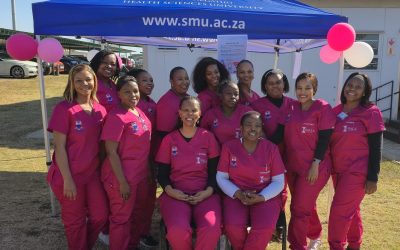In a significant affirmation of his ongoing dedication to public health governance, Dev Mamabolo, Projects Coordinator in the Technology Transfer Office at Sefako Makgatho Health Sciences University (SMU), has been reappointed to the board of Bertha Gxowa Hospital. He will serve in this capacity until March 2028.
 Speaking after the announcement, Mamabolo expressed both gratitude and enthusiasm for the opportunity to continue contributing. “There were over 5,000 applicants considered, so to be reappointed is not only an honour but also incredibly reassuring,” he said. “It’s exciting to be given another opportunity to serve the people of Gauteng with integrity.”
Speaking after the announcement, Mamabolo expressed both gratitude and enthusiasm for the opportunity to continue contributing. “There were over 5,000 applicants considered, so to be reappointed is not only an honour but also incredibly reassuring,” he said. “It’s exciting to be given another opportunity to serve the people of Gauteng with integrity.”
This marks Mamabolo’s second term on the hospital board, having initially joined in 2023 through a nomination process. His reappointment is intended to ensure continuity and enhance the value brought to the institution. At SMU, his work focuses on driving innovation and research commercialisation — expertise he is keen to apply in the public healthcare space. “Personally, this is a confidence booster. Professionally, it reaffirms that my contributions are recognised by both the hospital and the Gauteng Department of Health & Wellness,” Mamabolo added.
His vision for the upcoming term is to embed innovation within the hospital’s service delivery model. “Digital health technologies such as telemedicine, mobile health applications, and data analytics can significantly enhance care, disease surveillance, and encourage healthy behaviours. Innovation must be part of the boardroom agenda,” he asserted.
Mamabolo acknowledges the demands of balancing his board duties with his role at SMU. “Strategic time management, prioritisation, and a clear understanding of the board’s role are key to succeeding in both spaces,” he said.
He also addressed some of the pressing challenges facing public hospitals, particularly the strain caused by undocumented foreign nationals seeking care.
“While Section 27(1) of the Constitution ensures everyone’s right to access healthcare, we must consider sustainable solutions. As board members, we advise the MEC and can recommend policy directions, such as requiring medical insurance for visitors, similar to international practice.”
Mamabolo sees immense value in strengthening collaboration between academic institutions like SMU and public hospitals. “These partnerships can improve research, education, and the implementation of public health initiatives. SMU’s strength in health sciences should directly support the operational needs of healthcare facilities.”
He has outlined several outcomes he hopes to achieve during his term: improved financial systems, the integration of technology, stronger community engagement, and increased collaboration with industry partners.
On the importance of community involvement, he emphasised: “Community participation enhances accountability and responsiveness. Hospitals must actively involve residents to understand barriers to care and work towards inclusive solutions.”
Looking to the future, Mamabolo believes this role positions him to make broader contributions to healthcare governance. “It provides a front-row seat to the realities of our public health system and an opportunity to shape policy beyond the university context.”
To professionals aspiring to serve in similar roles, his message is clear and encouraging: “The public health sector needs your voice. Your insights can help shape a more equitable and effective healthcare system. Together, we can build a healthier society.”
By Tumelo Moila



